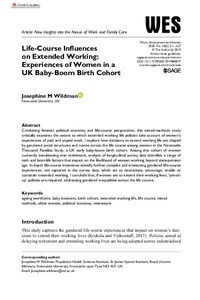Life-course influences on extended working: experiences of women in a uk baby-boom birth cohort

2020
34
2
April
211-227
ageing population ; older worker ; working life ; retirement ; family
Working time and leave
https://doi.org/10.1177/0950017019880077
English
Bibliogr.
" Combining feminist political economy and life-course perspectives, this mixed-methods study critically examines the extent to which extended working life policies take account of women's experiences of paid and unpaid work. I explore how decisions to extend working life are shaped by gendered social structures and norms across the life course among women in the Newcastle Thousand Families Study, a UK early baby-boom birth cohort. Among this cohort of women currently transitioning into retirement, analysis of longitudinal survey data identifies a range of mid- and later-life factors that impact on the likelihood of women working beyond state-pension age. In-depth life-course interviews identify further complex and interacting gendered life-course experiences, not captured in the survey data, which act to necessitate, encourage, enable or constrain extended working. I conclude that, if women are to extend their working lives, ‘joined-up' policies are required, addressing gendered inequalities across the life course."
Digital
The ETUI is co-funded by the European Union. Views and opinions expressed are however those of the author(s) only and do not necessarily reflect those of the European Union or the ETUI.